Does Your Team Feel Unseen? Close the Leadership Disconnect with 2-Way Communication
Editor's Note: In July 2025, EMS1 and Fitch & Associates released their annual EMS trend survey, What Paramedics Want, proudly sponsored by Pulsara....
13 min read
 Team Pulsara
:
Jan 25, 2023
Team Pulsara
:
Jan 25, 2023
![Think Like a Detective: Hacks To Improve Your History-Taking [PT1]](https://www.pulsara.com/hubfs/Podcast%2020221117%20%20Header%20Image%20for%20EMS1%20interview%20with%20Kris.jpg)
Pulsara's Chief Growth Officer, Kris Kaull, recently had the opportunity to sit down with Rob Lawrence on the EMS One-Stop podcast. In this episode, Rob talks with Kris about history taking and how to improve communication and gather better intel. Kris shares his top 10 hacks to improve your history taking, including thinking like a detective, thinking outside the box, understanding medical medicine, being a good listener, and more.
This podcast originally aired on EMS One-Stop on November 17, 2022. Listen to the podcast and check out the full transcript below.
NOTE: This transcript has been edited for brevity and clarity.
Rob Lawrence
Hello and welcome back to another edition of EMS One-Stop. I'm your host, Rob Lawrence, and don't forget, we're now on a brand new channel all on our own. We separated from the Inside EMS1 boys. We love you all, but actually, we're now flying alone. And so of course, please like and subscribe. I'll get that in early before you go away. On to the main guest this week: I'm delighted to welcome the Chief Growth Officer for Pulsara, Kris Kaull. Kris, welcome, sir.
Kris Kaull
Oh, man, what a pleasure. Thanks for inviting me.
Rob Lawrence
For full disclosure, we're both sitting here looking at each other on the screen, drinking really good coffee. For further full disclosure, we spent all weekend drinking other stuff as well, perhaps. And the reason why is because we were up in Montana, in Billings, at the Big Sky EMS conference. And I've got to say, if you need to go to a regional conference that's friendly, welcoming, and with some amazing education, head for Montana next year. Let's talk about that first, Kris, because, of course, you and I were there presenting. Tell us about the Big Sky EMS conference. Let's give it some love.
Kris Kaull
Yeah! So the Big Sky EMS Symposium. Lyndy Gurchiek and I were counting the years—it's right around 25, 26, 27 years that it's been going on. They have a really cool format, and this was an all-time high. And, you know, I'm partial, I'm from Montana and I am biased when I talk about this. I think that there's a lot of value in high performance, busy urban systems, but everybody talks about that. I think there's equal value in the underserved rural communities where every transport is two, three, four, five, six, seven hours. And you have people who have low call volume, are under-resourced, and they’re caring about the community. I always say they're a plumber by day and volunteer EMT at night. And yet the level of care, the critical nature of their patients, and the standard they’re held to is so amazingly high.
At this conference, every session is a general session; every presentation is a keynote. And there must have been over 250 people in this room, engaged. And Lyndy and her team just do a fantastic job of saying, “Who are some of the industry's best speakers, textbook authors, and nationally recognized influencers, and how do I get them to sit down and share their story and impart wisdom or thoughts and ideas to our team in Montana?” It's very well received. It keeps growing. You're right—come to Montana. It's fantastic.
Rob Lawrence
I want to pick up on something you said there, because there's only one other conference where every session is a plenary—is a keynote—and has that same influence and effect on people. And for you folks in Montana, I have to tell you, it's Eagles. It's the only other place I've seen that they do that, and you get the benefit of really cool speakers, including you, Kris. Also, let's shout out to Dan Batsie and Joe Mistovich, who are also legendary EMS speakers. The chance to benefit from their wisdom and their words, and everybody gets [to listen] together.
The other thing I'm going to pick up on is, I came from a rural part of the UK in the east of England, where people said, “Oh, you're all farmers and you don't do a lot of good medicine,” to your point. Yeah, but when you go on out to the next hospital, you have to be a really good medic.
Kris Kaull
And there's no hiding, right? So you're in Las Vegas, and you know, I have a short transport time. Five, ten, fifteen minutes, maybe, and I have to pick which one of my trauma centers, and then which one of those triage nurses, and there's a lot of turnover right now. And so, you know, there's an opportunity to be anonymous.
And let's give a shout-out to the urban environment: Call volume after call volume, long wall times. Lots of skill retention, lots of patients.
On the flip side, [in rural settings], it's the opposite of that—where, when you transport that patient, that doc probably has your personal number in their phone, and they expect to call you up and ask you some questions that are at the mid-level or even paramedic level, or even physician level. And as an EMT, they want to know that good history, and they want to ask you follow-up questions.
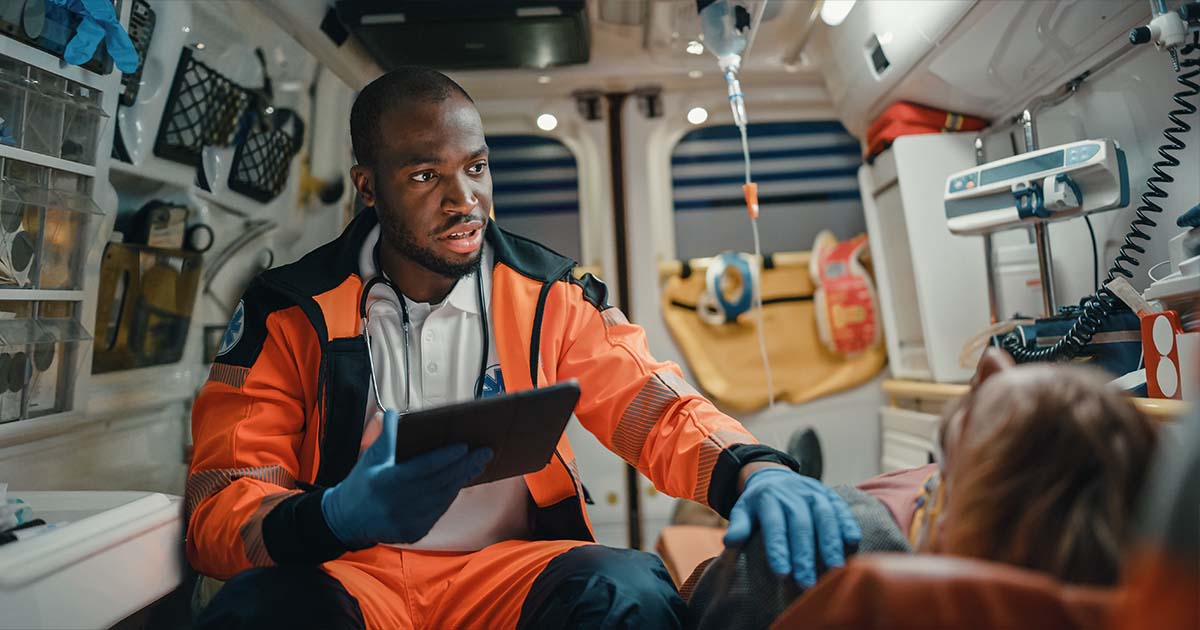
Rob Lawrence
If you've watched the Dr. Glaucomflecken skits on rural medicine, it's just that. And when I went to Montana this weekend, it took me back also to chatting with some mates from the Royal Flying Doctor Service. You know, when you know the farmer's pain score, what is a ten for us is a two for them. And also just the resilience of people in these areas. But it doesn't take away from the fact that you need to have a good system, and obviously a lot of helicopters (that's what you do in your spare time), and a great chain of evacuation to get these people from literally the middle of nowhere to places where they can get definitive care. And so we shouldn't underestimate that.
If you need a good regional conference, Montana has an outstanding EMS conference, and I commend that you look it up next year. Some friends of mine have already gone, “Wow, I didn't know that was going on. I'm going to have to mark that up for next year.”
Anyway, the reason I asked you to come on this morning, Kris, is because you gave an amazing session: “‘Why Did You Call 911?’ And Other Terrible Questions That Hinder Your Medical History.” It really struck me that the narrative, the history taking, and the way that we achieve that, has to be top rate. For many, many reasons: from the good old fashioned billing through to the fact that you’re now in the dock, under oath, talking about what you just wrote, and everything in the middle. And so talk us through that, Kris.
Kris Kaull
Yeah. My background is prehospital medicine. Next year, it'll be my 30-year anniversary. And [I’ve done] everything from [being] an EMT, in rural areas to urban, to the last 10-12 years in critical care flight medicine. And in that, [I’ve even had] opportunities to run an ambulance service. So I've kind of seen the whole gamut.
Over the past year, I've been really digging into this concept of, what makes a physician, medic, nurse, PA, nurse practitioner—I'm looking at all these scopes. For an EMT, what is the difference between us and our scope of medicine, and a physician? And if you think, “Well, skills,” I don't know. Right? Certainly, physicians can start IVs, they put in chest tubes, they do these things. There might be a few other additional skills. They're better at reading imaging. They might do a lumbar puncture, but it's not actually the skills that separate us from a position. It's their medical knowledge and their ability to ask really good questions. So I went back and I said, “Let's talk about medical history.” And beyond that, what I’d like to do is start at the beginning and snap the chalk line of like, let's start here with SAMPLE OPQRST, and quickly walk through maybe a quick case scenario. Just a few questions, and then let's dig in. I have these hacks I'd like to share with you, Rob, for making us better medical question individuals.
Rob Lawrence
And with your permission, I will put those hacks in the show notes and also the rather cool video you shared of situational awareness. I won't issue any spoilers now, but I think that was absolutely outstanding as well. So if we can do that, we'll put that in the show notes too. So anyway, do carry on.
Kris Kaull
Yeah. Let’s start at the beginning. We can do a lot of things, right? We do a lot of things every day. Sometimes we eat, Sometimes we read, and sometimes we exercise. Some of us a lot, some of us rarely. We work. Sometimes we play.
Every day, we communicate. And communication is an art. It's something—especially medical history, communicating is something that takes a lot of practice, and you know that when we start, we start at the basics and say, “Hey, here's the basic, very simple questions you need to ask.” And we use acronyms in our industry. So you have the word SAMPLE, OPQRST. It's probably not uncommon to most of those that are listening today that, when you’re first starting out, you actually put a piece of like two-inch tape on your leg and you write the SAMPLE and OPQRST and as you're going into your scenarios or learning your skills, you kind of walk through that.
But that isn't the end of our medical history. I look at that as the beginning. The basis of a good history takes practice. It takes patience. It takes understanding. And, it takes concentration. And Rob, I'll tell you, on our best day with our best patients, there's still this wall of resistance. They're in pain. They may be the elderly or the very young. They might have cultural differences from us. They may be sick or lethargic, or altered mental status. They may have different language barriers. And then let's talk about us. It's unfair to think that we would be at our best every day, every time. We may be tired or have things going on in our personal life. So we have this wall of resistance, and we have to get over that.
And so this whole communicating and this entire history-taking is a practiced, intentional skill. And studies out there show that, hey, we might be able to, 70% of the time, make a diagnosis based on just history alone.
Rob Lawrence
So that was the history of history. But take us into the hacks.
Kris Kaull
Yes. So let's start the beginning. There's SAMPLE, OPQRST, right? And we know that’s signs and symptoms, allergies, medications, past medical history, last oral intake, events leading up to this. Onset, provokes, the quality, radiates, severity, and time.
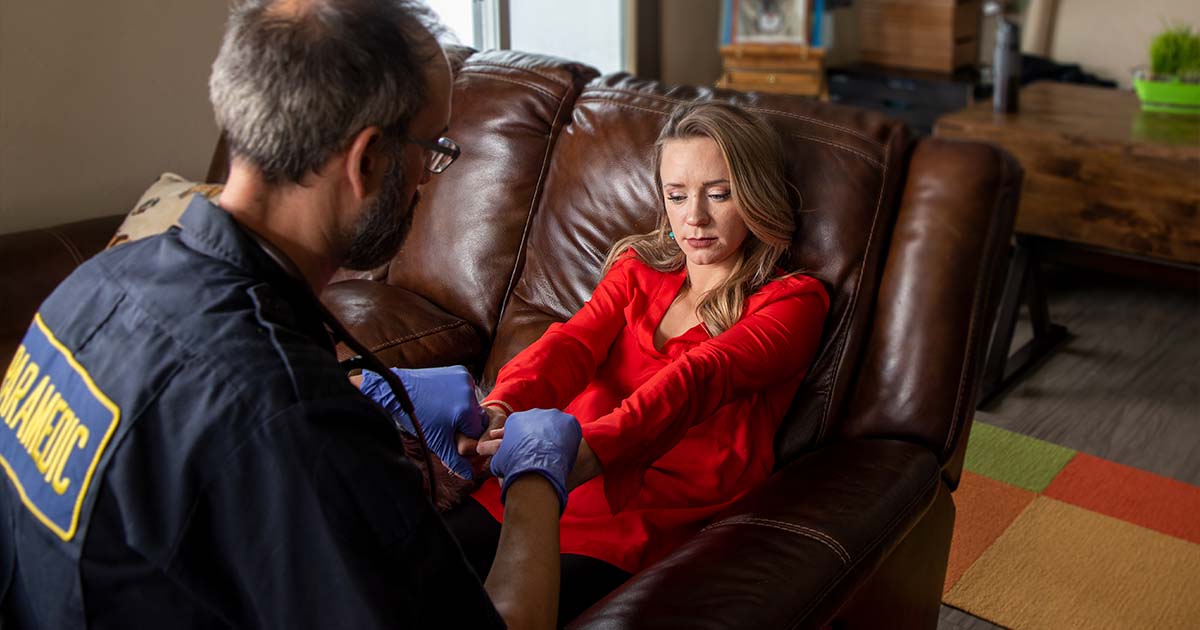
So I respond with rural EMS as an EMT to a person not feeling well. I say: Hey, what's going on today?
And they say: Well, I'm weak. I can't catch my breath.
Do you have any allergies?
None that I'm aware of.
Okay, any medications?
I was recently prescribed some heart medications.
All right. How about any past medical history that pertains to this?
Oh, I had a cardiac workup last week.
And have you eaten today?
Lunch was about 2 hours ago. And then what happened is that I started taking the dog for a walk and started to not feel very good. I couldn’t catch my breath and sat down.
All right. So you said about 10 minutes ago?
Yeah.
What makes it worse?
Well, as I continued to walk, it got worse, but it feels a little bit better when I sit down.
Tell me about that pain.
Well, I wouldn't even describe it as pain. It's like—it's more of a pressure.
Well, does it radiate anywhere?
Uh, I don't even know what radiating means.
Oh, yeah. Do you feel any other pain anywhere?
Maybe a little bit in my jaw. I don't know.
On a scale from 1 to 10, ten being the worst pressure you've ever felt, what would you put this up?
Mmm, 4?
Anything else going on? The last year?
No, just this cardiac history. It's been going on since about January.
Those are the back-to-the-basics. Now I'm going to talk to you about some of the hacks that can make us better. Maya Angelou said, “Do the best you can until you know better. Then when you know better, do better.”
And so this got me thinking: “Let me listen to some podcasts, let me read articles, let me study about how to take good histories.” You know, there wasn't very much to go on. I had a lot of trouble finding any podcasts, any articles, any tricks, or tips. And so I started thinking, who else asks lots and lots of questions, and who makes a really good interviewer? And after a ton of studying, I basically narrowed it down to murder mysteries—whether you watch murder mysteries on TV or you play murder mysteries—people who play a lot of games solving riddles, people who think differently, have strong situational awareness, detectives, interviewers on TV or podcasts. And this cornerstone is just like really understanding medicine to ask the right questions.
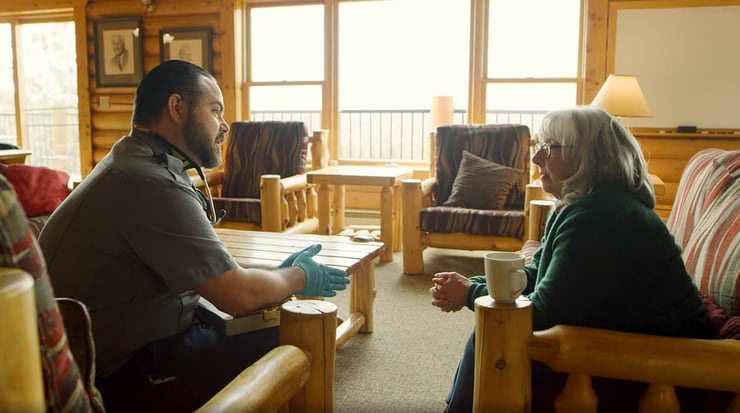
Rob Lawrence
Well, I'm just going to jump in before you carry on and say we had this discussion about, you know, who's a good interviewer. And my response to you was, as a podcaster, I'm going to ask the question, and then I'm just going to listen because you've got more information than I have. So keep going, and I'm listening.
Kris Kaull
Yeah, that's one of the hacks, right? So history-taking hack number one. And of course, these are Kris Kaull’s own biased anecdotal history-taking hacks. And the first one is think like a detective. My wife and I were recently spending time rewatching the Castle series with Kate Beckett and Richard Castle. He's an author and a writer, and she's a captain in the LAPD. They're in there, and they’re working, and almost every way when it looks like it's going to go one direction, by asking more questions, they get a better picture. So they don't just say, “what's your pain on a scale from 1 to 4” and say, oh, it's four.
Has it gotten worse? Has it gotten better? And it seems like, well, it's gotten better. Like, oh, what made it better? When I relaxed. Have you had this before? They just keep asking questions and questions. So number one is, think like a detective.
History-taking hack number two is playing games. We had a Milton Bradley game back in the 80s, maybe early 90s called Crack the Case. And basically, it says, here's the scenario. You ask the scenario, and then as the person who knows the answer, I tell everybody else in the room that I can only answer “yes,” “no,” or “doesn't pertain to this case.”
And so the scenario that I would give you if I pulled out this box and I read the Crack the Case question, it says: There is a woman who is now missing. She’s nowhere to be found. All of her belongings are still here, including the clothes she was wearing, laying in a puddle of water.
Well, that's it? I need to solve this case. So you start asking questions: Is this a real person? No. Is this a story? Yes. Is it from a movie? Yes. As you start walking through, you actually discover that this is from The Wizard of Oz. It's the Wicked Witch. And when Dorothy put water on her, she melted and left her clothes there. And so that was the answer. So by playing these solving-type games, you start asking a lot of these questions.
Hack number three is: how do I practice and become a better questioner? How do I become a better medical history taker? Hack number three is riddles.
I can give you a riddle: There's a gentleman. He's been imprisoned. He has a shovel. (Why does he have a shovel in a cell? Well, I'm the one putting the riddle, so it just is.) And so he's in this closed cell. There are no windows. There is a skylight above him. And he knows that if he uses the shovel to dig a hole, it hits concrete. And there's no way he can get past and dig a tunnel out. But yet, every day, he's digging and digging and digging and digging. Why is he digging?
Well, as you start asking me questions, it's the concept of thinking differently, right? The idea is, he's digging not because of the hole, but because of the pile of dirt that he's making. The more that he digs holes, the more dirt he has to climb up and get out and escape from the skylight. The other riddle that I share is: There are two men. They’re football aficionados. One's a tall, lanky kicker of a football team, and the other one is—and when I say football, Rob, I'm talking American football.
Rob Lawrence
For my international audience, of course, we're talking about the other football, not association football. Sorry. Do go on.
Kris Kaull
Yes, exactly. And so this football player, you have the kicker, and then you have this linebacker. Big guy, right? And they sit down, and they both order the same drink. All of a sudden, the kicker gets a phone call. He looks at his phone and he says, “Oh, I have to go.” He downs his drink quickly and leaves. The other one, the big linebacker, continues to sip on his drink while he's watching the game. Over the period of a couple of hours, he finishes his drink, he leaves. Later, he is found dead. What happened?
And as you start to go through, like: was there a difference between the people? No. Was it because one guy was big and one was skinny? No. Were their drinks different? No. Were there drinks identical? Yes. Was it something that was in the drink?
You can keep asking these questions with yes or no answers. And the answer to the riddle is, well, the poison wasn't in the drink, but it was in the ice cubes. So as the linebacker drank slowly, the ice cubes melted, put the poison into the drink, and that's why he died. Right?
So that's history-taking hack number three: asking a lot of questions and practicing riddles.
History-taking hack number four: thinking outside the box.
You've all seen it, there are—and I have to do a shout out to Joe Mistovich and Dan Limmer—there's a chapter in that Brady book of Dan Limmer’s that says, “How do we think critically?”
And there is this concept of thinking outside the box. And that's actually the spoiler alert.
There are nine dots, kind of like tic-tac-toe. There are three across the top, three in the middle, and three at the bottom. How do you connect all the dots with just four lines? And the answer is, it's impossible to do unless you break the rules. But—there were no rules. I just said, how do you connect all nine dots? But because we put our own societal rules on here, it's impossible to connect all nine dots with four lines—unless you go outside that box and make a bigger set of lines. And in the show notes we’ll send links to these different areas. It’s just: think differently, think creatively, think outside the box.
Rob Lawrence
Think outside the box—a bit like the Kobayashi Maru exam, where Captain Kirk did go outside of the conventions of the rules in order to achieve a victory. And so, yes, we have to be able to think creatively in order to be successful.
Kris Kaull
Oh wow! That was actually both timely and a little bit geeky, for those of you like myself who are sci-fi geeks. So tell us that story!
Rob Lawrence
All in order, as we all know, right, Kris? In order to graduate from the Starfleet Academy, you have to pass that capstone class, that final test, that final exercise, that final hill that you have to climb in order to succeed. And of course, the Kobayashi Maru was set up to be unachievable within the conventions of normal thinking, normal operating, and normal training.
However, Captain James T. Kirk would always go boldly further than anybody else, and he thought outside the box. He thought outside the rules and conventions in order to achieve it. Now, of course, he was then taken to task with, “You basically cheated!” And he said no, I didn't cheat. I actually thought differently and went a different way about achieving the objective, which was to succeed in the final exam.
And so it's about the way that you think and the way that you operate and coming back to the way that you take history. So if you're a sci-fi geek, Kobayashi Maru. Carry on with the next hack, Kris.
Check out Kris's presentation materials here, and stay tuned for Part 2, in which Kris and Rob will discuss more hacks for improving your history-taking!
![]()
When a health system is looking for ways to improve patient care, there are a lot of factors to consider. How will new solutions affect existing workflows, and how will they reduce time-to-treatment for patients? Check out this episode of the Becker's Healthcare podcast, where host Marcus Robertson and Kate Leatherby, Pulsara's Sales VP for the West, sit down to discuss.
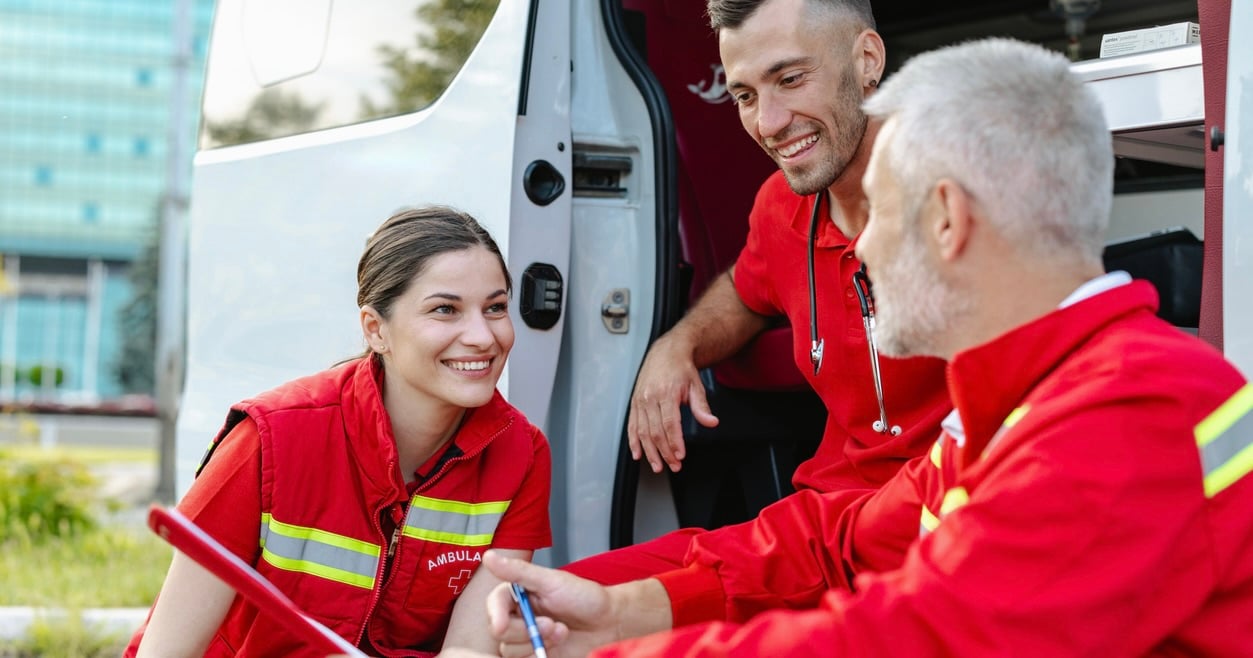
Editor's Note: In July 2025, EMS1 and Fitch & Associates released their annual EMS trend survey, What Paramedics Want, proudly sponsored by Pulsara....
![[PRESS RELEASE] Published Research Finds Up to 31% Faster STEMI Treatment Times in Rural Hospital Setting with Pulsara](https://www.pulsara.com/hubfs/_1_website-page-blog-assets/pulsara-hosp-teams-assign-cardio-stemi-rn-1200x701.jpg)
Published research shows how using Pulsara, alongside standardized field activation and a focus on stakeholder relationships, improves STEMI care and...
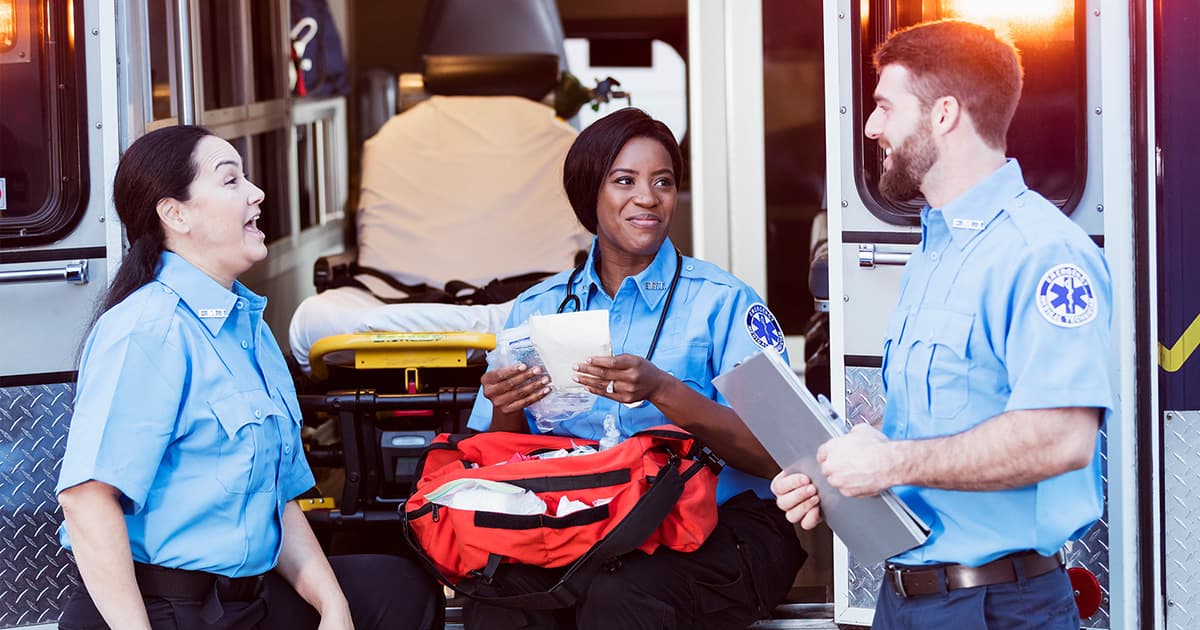
Editor's Note: In July 2025, EMS1 and Fitch & Associates released their annual EMS trend survey, What Paramedics Want, proudly sponsored by Pulsara....